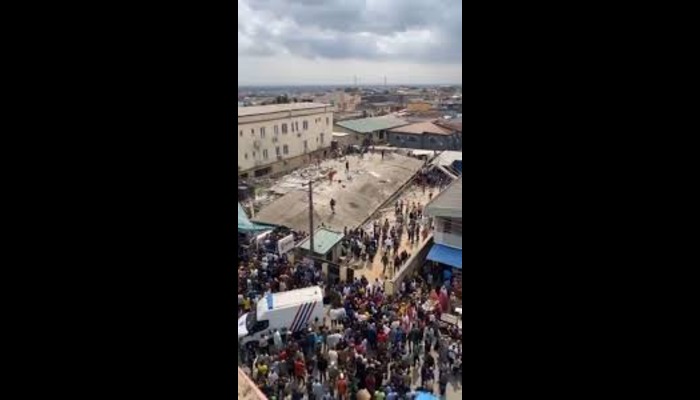The Lagos State Government has attributed the recent four-storey building collapse in the Ojodu-Berger area to long-standing neglect and the detrimental effects of moisture on an unfinished structure.
The State Commissioner for Physical Planning and Urban Development, Dr. Olumide Oluyinka, made this known while speaking on the circumstances that led to the incident, which occurred on Saturday.
It was gathered that one person was confirmed dead while 13 others rescued.
READ ALSO: 14 rescued, many trapped in Lagos building collapse
According to Dr. Oluyinka, the building had been left abandoned for over 13 years without plastering or proper finishing, making it vulnerable to water penetration.
He stated that the structure, described as a frame structure, was compromised over time due to prolonged exposure to moisture.

“Let me just give you a background of building construction,” Dr. Oluyinka began. “This is what they call a frame structure. That is, you have the reinforcement and concrete and the formwork. Now, when you have that kind of a structure, it’s not yet covered, it’s not yet encased, it’s not yet plastered.”
He explained that when such structures are left exposed, especially without appropriate design or protection, water seeps into the concrete, weakening the reinforcement that forms the backbone of the building’s strength.
“If you don’t leave it for long, the tendency is that water will penetrate, especially if the construction is not drawn properly. In any constructional element—whether it be the foundation, the columns, the beams, or the floor slab—water must not enter into it. Because the danger in construction is when water penetrates the structures to affect the reinforcement,” the Commissioner said.
Dr. Oluyinka emphasized that the integrity of the reinforcement is critical to the structural stability of buildings. In the Ojodu-Berger case, he revealed that the reinforcement had likely deteriorated over time due to continuous exposure to water.
“So, chances are, which is most likely what happened, that water has penetrated the structure, thereby affecting the reinforcement. And the tendency of that is that once water goes in, it weakens that structure. And once the structure is weakened, this is what happens,” he explained.
Beyond this specific incident, the Commissioner used the opportunity to call public attention to the risks of moisture infiltration in all types of buildings, even in minor household scenarios.
“For example, if you have a leaking WC in your building, or a leaking window, what happens is that water will come from the window, instead of the rain going out, it penetrates the wall, the window into the wall, and it goes into the slab. And if it continues like that, it now weakens the structure,” he warned.
Dr. Oluyinka also noted that visible signs of structural deterioration, such as rusting or discoloration of reinforcement bars (rebar), indicate that the integrity of the building has already been compromised by water damage.
He criticized the building’s owner or developer for failing to notify the authorities before resuming or continuing construction on the abandoned structure.
“What this guy probably is supposed to have done, after some time, is to notify the authority that having left this building at this point, we are now ready to continue with the process,” he said.
The Commissioner also condemned the commercial use of the space beneath the unstable building, stressing that the area was unsuitable for such activity. “The area was unsuitable for the commercial activities taking place beneath it,” he said firmly.
The Lagos State Government is continuing its investigations into the collapse and is expected to reinforce monitoring of abandoned structures across the state, especially those left incomplete for prolonged periods.
As part of a broader strategy to prevent future incidents, officials are urging property owners and developers to maintain constant communication with regulatory bodies and ensure that all structural works meet the safety standards required under Lagos State building codes.

